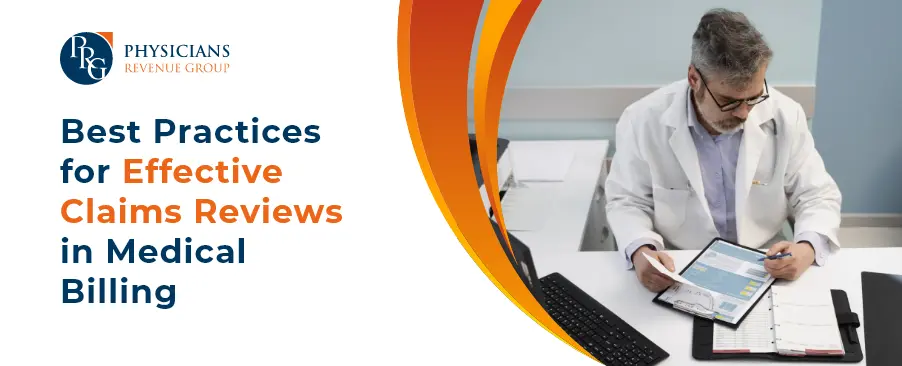
Email: info@prgmd.com | Call: +1 (630) 242-6474
Business hours: 9:00 to 5:00 | Monday to Friday
Email: info@prgmd.com | Call: +1 (630) 242-6474
Business hours: 9:00 to 5:00 | Monday to Friday

Table of Contents
ToggleHealthcare professionals, physicians, and doctors worldwide spend their lifetimes mastering their crafts in patient care and treatments. Their efforts make it possible for patients to live healthier, meaningful, and fuller lives. However, in all those years of learning, they have not taken a masterclass in processing medical claims or handling claims reviews. That in addition to not knowing how to get patients to pay their bills, leads to third-party medical billing services.
Another important aspect of improving the claims review process involves conducting regular training sessions for the billing staff. These sessions are essential for keeping the staff updated with the latest billing guidelines and payer requirements. A well-trained team is better equipped to identify potential errors during the claim scrubbing process and efficiently resolve any issues that may arise.
In addition to implementing robust software and providing continuous training, healthcare providers should emphasize the importance of communication and collaboration among the staff involved in the claims review process. This collaborative approach ensures that any identified issues are addressed promptly and accurately.
Note: Correcting and resubmitting rejected claims is essential.
Internal audits of the claims reviews process help healthcare providers identify the following:
Overall, this feedback loop is key for refining the process, ensuring continuous accuracy, and maintaining compliance.
In medical billing, insurance companies face immense pressure to enhance:
Among these challenges, analytics emerge as a valuable tool. Through analytics, insurance companies can enhance performance and ensure compliance. The strategic use of analytics and automation enables:
Insurance companies often face uncertainties about error sources and challenges in the current landscape.
Analytics offers a viable solution by providing the capabilities to identify common errors, manage complex claims, eliminate performance variability, reduce operating costs, and efficiently deploy skilled personnel.
Sending patient invoices punctually is vital for successful claims reviews in medical billing. Once the explanation of benefits (EOB) is posted, the patient invoice should be dispatched immediately. This ensures higher chances of timely payment from patients.
Patient invoices should be clear and comprehensive, detailing services performed, date of service, payments received, insurance reimbursements, and any remaining balance. It’s essential to make the invoice easy to understand and provide a patient-friendly look and feel.
Moreover, consider offering convenient payment options, such as credit card payments, over the Internet, or phone payments. This speeds up the payment process, reduces costs, and saves patients the time and effort of writing and mailing a check.
Another essential aspect of effective claims reviews is recognizing the value of eligibility verification in RCM. This process ensures accurate and timely reimbursements by confirming a patient’s insurance coverage and benefits eligibility. By incorporating eligibility verification into the claims review process, healthcare providers can reduce errors, maintain compliance with regulatory guidelines, and improve operational efficiency. This contributes to a smoother billing process and enhances the trust and satisfaction of healthcare providers and patients alike.
Automated claim scrubbing eliminates time-consuming manual claims reviews and reduces the need for rework due to errors. It allows physicians to allocate resources more effectively, focusing on patient care and improving operational efficiency.
Incorporating claims review or scrubbing into medical billing practices is essential for minimizing errors, ensuring timely reimbursements, maintaining compliance, and enhancing operational efficiency.
Effective claims review in medical billing brings significant benefits for insurance claims. Firstly, efficient claims reviews minimize errors, reducing the chances of claim denials. This ensures a smoother cash flow and lessens the administrative burden of appealing denied claims. Additionally, these reviews accelerate reimbursement processes, providing healthcare providers faster access to funds. Improved cash flow, in turn, enhances the financial stability of medical practices, making it easier to cover operating expenses and invest in various aspects of the business.
Share:
Categories
Recently Added

What is an ABN in medical billing?

What does a Clearinghouse do During Claims Submission?

What is EOR in Medical Billing?
We Would Love to Assist You!
We treat your data confidentially and don’t share any information with a third party.